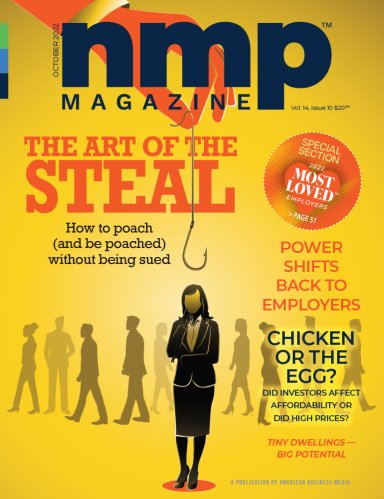Now, recruiting is not as easy as calling up a loan officer and offering a sign-on bonus. Cold-calling loan officers and offering them a job may come across as suspicious or even like harassment. Jonathan Fowler, vice president of business development at American Financial Network, calls it the “shotgun approach.”
“Ask any loan officer who is closing at least five loans a month — they don’t even have to be a top producer — any loan officer, and they’ll likely tell you they prefer to reach out to a recruiter instead of getting a cold call from someone they don’t know,” Fowler said.
Fowler, who is an experienced recruiter in the industry and has had his fair share of recruiters contact him, explains what good “aggressive” recruiters do.
“I had a great phone call from a [recruiter] the other day,” Fowler said. “She was aggressive but she did a great job promoting her company. She found me on LinkedIn, and started using social media to make her presence known. She would comment or emote on my post, then she started sending me messages, asking me if it was OK to set up a phone call. She did a great job and I hope she goes far.”
One of the biggest mistakes a recruiter can make, Fowler said, is disparage the company the employee is currently working for. Fowler says this makes the recruiting target suspicious — it sends the message that this recruiter cares about damaging their competitor rather than snagging the person they’re recruiting.
Use The Positives
Neither Jacobs nor Fowler claim to engage in this aggressive type of recruiting. Fowler said he does not have a pitch to throw at people and he rarely, if ever, reaches out to individuals to recruit them. Instead he uses the positives of the company he is at and relays that information to everyone, and the ones that reach out with questions or show interest are recruitable.
“The people who make these poaching or recruiting calls have no value to add,” Fowler said. “Most of them don’t even know what it’s like to be a loan officer. They’re just trying to get someone to move over in what I call this horrible shotgun approach.”
Jacobs said he avoids aggressive recruiting tactics because he dislikes paying attorneys. “So over the years as I’ve built organizations, we did not aggressively outbound recruit people, because part of our process is to ask if they have restrictive covenants and we insisted they follow them. What that often resulted in was we couldn’t get the entire branch because they didn’t read their agreement and they weren’t allowed to bring a lot of the people with them. But sometimes they could.”
Jacobs said his company takes a more passive approach by mostly sticking to inbound recruiting where they’d market what they were doing through direct mail or paid ads.
Information ‘Stealing’
Poaching from your competitor usually isn’t the sole cause for these lawsuits. More so, it has to do with stealing information from competitors.
It’s common practice for mortgage professionals to hop from one company to the next. It’s a cyclical business with a high turnover rate, so unless someone’s employment contract states otherwise, it’s OK for loan officers to leave and begin working with their competitor. (In some agreements, it states that an employee cannot work for a direct competitor for a stipulated amount of time.)
However, stealing company information can lead to legal trouble. In most poaching lawsuits between mortgage companies, terms like “trade secrets” and “confidential proprietary information” pop up. But what exactly does that mean?
For the most part, they’re talking about customer lists. Other stolen information like marketing campaigns and company reports are not going to divert money away from a lender or brokerage, but the clients are their bread and butter. Every lender’s entire business depends on their clientele.
“There are very few company secrets in this business,” Jacobs said. “No one has the Coke recipe in their vault. We’re all dealing with the same agencies, selling the same loans, using the same guidelines. We all have a version of the same processes. Are there really some instances of company secrets? I would say perhaps when a company is heavily invested in expensive marketing campaigns and manipulating their data for conversions … Yes, that’s a secret. But other than very few instances, I kind of laugh at this idea of company secrets — we’re all selling the exact same thing.”
Lists Are Central
Customer lists are central in this battle and are the main reason these poaching lawsuits get filed.
Debra Killian, former co-owner of Charter Oak Lending Group, was a victim of poaching in 2004 when all of her employees left to work for her competitor, CTX, bringing their customer lists along with them.
Killian decided to go toe-to-toe with the then-mortgage giant in court. She was surprised to hear her former employees claim they were “independent contractors” instead of W-2 employees.
“Using the independent contractor premise, they basically said they own their clients,” Killian said. “But loan officers who have no ownership in the company must be paid on a W-2. We paid every one of our employees on a W-2. We withheld taxes, we had a 401(k), we offered other benefits a W-2 worker would typically get. They were claiming to be independent contractors with the benefit of employee status.”
Killian insists that her former employees knew what they were doing was wrong. She said everyone on her staff was provided a copy of the employee handbook and they reviewed it annually.
“We had an employee handbook that said you must refrain from any conflict of interests. You need to be working for one company at a time, so you can’t work with your competitor while you’re also working for us — kind of common sense things,” Killian said. “We also had a very simple paragraph in the employee handbook that basically said all data and files are property of the company and they are not to be shared with anyone outside of the company for any reason.”
‘Nobody Owns The Client’
However, ownership of customer lists is not as black and white as that — not even in court.
Fowler admits that a federal court will say the company owns the clients and lenders subscribe to that belief for obvious reasons. The loan officer community, on the other hand, will say nobody owns the client. For the most part, loan officers think if you were to ask the client who they choose to work with, they’d follow the loan officer.
Loan officers and brokers have access to their own pipeline. They got those leads (unless the company paid for them), they formed a relationship with the borrower, and they are tracking the progress of those loans. In most cases, loan officers and brokers build their entire pipeline themselves or with the assistance of their support staff who they hire themselves. After putting in all that effort to build their pipeline, it’s no wonder why they feel possessive.
“The salesforce is out there gathering those names and that information,” Fowler said. “They’re the ones borrowers are following up with, they’re the ones who run into clients in the grocery store, and so forth — not the legal firm, not the compliance officer, or any of those people.”
It’s You — Not Your Logo
Fowler says most seasoned loan officers have what he calls a “seasons greeting list” made up of past clients so they can stay in contact with each other, and the loan officer can get more referrals.
“As a borrower, I do not do business with you because of the moniker on your shirt,” Fowler said. “I do business with you because I feel like I could trust you, I like you, and you seem to work hard for me.”
So, if anyone were to ask the client who they would prefer to continue working with, either the loan officer at the new company or their original lender, they might be more inclined to choose the loan officer.
In reality, the borrower likely chooses to work with a specific lender because of the loan officer and the products the lender offers. They can be swayed in either direction with a little convincing, but the loan officer has already built a relationship with that borrower so they’re likely better at luring them in.
The only opinion that matters, though, is a judge’s opinion. In most cases, the wealthiest company wins because it has the financial endurance to pursue litigation.
David Lykken, executive coach and business strategy consultant at Transformational Mortgage Solutions, who has testified as a witness in multiple poaching cases, said, “He who has more money and better attorneys wins.”
In Lykken’s experience, if there is good evidence that a company did not encourage information stealing, and the loan officers did it on their own, they can get away with it — not for free of course, as legal fees can quickly add up.
How To Prevent Poaching
It’s hard, as the owner or executive leader of a company, to prevent your sales team from being poached. Considering how much every mortgage company relies on its sales team to bring in business, it’s quite natural to be afraid of them.
Most of all, you want to avoid going to court, especially if you find yourself in a David vs. Goliath situation. If your competitor is much bigger than you, should you even attempt to hit back? Well, the answer is entirely up to you. But, if you do decide to hit back, make sure you’re financially prepared for a drawn-out battle.
As a leader, you want to command respect. You want your employees to like working for you. You don’t want to be a cruel boss, but you don’t want your employees to walk all over you either.
First, every business owner or leader should accept the fact that most, if not all, employees will leave you at some point. They’ll either retire, get married and move away, switch occupations, or get lured away by another mortgage company. The possibilities as to why are endless; therefore, you should discuss the proper way to leave with every employee that gets hired to avoid future conflicts.
Plenty of companies review their employee handbook annually with their staff. Unfortunately, that won’t be enough to dissuade them from leaving and stealing company information on the way out. Lykken suggests showing them concrete examples of what happens when you steal company property and leak information to competitors.
“Tell them it’s OK to leave and educate them on how,” Lykken said. “Give examples of people who got sued and use case law to educate your loan officers.”
Don’t Get Blacklisted
Lykken said he saw one company sue another for taking cups and pins, literally. These lawsuits can start with something as small as office supplies before they start thinking about what else you might have taken.
“It’s called going nuclear,” Lykken said. “They’ll bring up everything you may or may not have done to wrong the company and pile it into a lawsuit.”
He said companies have access to loan officer logins, as well — they can track your location, IP address, and login times — so they know when and where you’re accessing client information.
“Loan officers can get fired from their new employer for stealing from their previous employer. They get blacklisted and may never work in the industry again. That, and they’ll have to pay millions of dollars in fines and fees,” Lykken said. “Do a better job of educating your team up front and be proactive in protecting information.”
When a loan officer agrees to engage in poaching, they must know the reputation, legal, and financial risks behind that decision. But is scaring your loan officers the only answer to gaining their loyalty? Of course not.
Jacobs recommends a strategy of open communication as well and a willingness to negotiate.
“I would often engage in a conversation that goes like this: Let’s look at the pipeline you’ve got. I want to know what your expectations are and I hear what they say, and then I inform them of what the agreement is. But, then I’ll set those things aside and say let’s talk about this practically.”
First, Jacobs and the employee will identify which leads the company paid for, and keep those. Self-generated leads, on the other hand, are negotiable.
“If we’ve got a locked loan or a loan in processing, typically what I would say is ‘We’re going to retain those. You’re not allowed to solicit those, and if the client calls you let them know you are being well taken care of elsewhere. For anything that closes in 30, 60, or maybe 90 days, we’ll pay you a certain amount per loan.’ It might be less than their regular commission because someone else is helping to close it, but we would come to a negotiation that way,” Jacobs said.
For any loans that have not been locked, gone under contract, or haven’t progressed much, the loan officer can take them, Jacob said. This way, the company can protect what it has invested in.
After adopting this strategy Jacobs has seen positive results, such as having a loan processor return to his company after leaving for a competitor. He suggests because they parted ways amicably, the woman felt comfortable enough to ask for her old job back and she got it.












